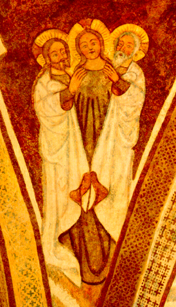Which, in one sense is quite true. (Although sometimes I feel as if I am a problem God has to solve.)
But on the other hand...as someone in my book discussion group put it, at heart we're all Gnostics; we all want to know. Both science and religion, at their best, honor this impulse to understand the world, both physical and spiritual, around us. Cambridge physicist-turned-Anglican-priest John Polkinghorne says, "In their search for truth, science and religion are intellectual cousins under the skin...religion is our encounter with divine reality, just as science is our encounter with physical reality."
Polkinghorne discusses the Trinity, in the context of a scientific sensibility, in this lecture . I wish I'd had this when speaking to the individual who just couldn't sign on to Christianity because of this particular doctrine; I think it might have helped.
My own favorite explanation for the Trinity, short and sweet, comes from Henri Nouwen: God loves relationships so much that God is a relationship.
I think down at the university that's called a working hypothesis. Hey -- it works for me.
Trinity, medieval German


5 comments:
Hey, LC: I'm here!
My ex (the Baptist preacher) once had this metaphor he trotted out for Trinity Sunday sermons: "3 scoops of ice cream, in three flavors: but one Ice Cream Cone!" (He may have been a d*ck---for leaving me, that is---but it's still a nice sermon-illustration!)
Love the Nouwen: that's the way that I (since seminary anyway) have understood the Trinity, also. God is never alone . . . and doesn't mean for God's children to be, either.
While the German church-art you provide at least has the virtue of suggesting the H.S. as the "Her" She is, I'll still go w/ Rublev's Trinity anyday (Fie on First-Person-of-the-Trinity as "Old White-Haired Man"!)
J.C.: I know what you mean...although since the "Lord of the Rings" trilogy came out, the Old Guy With White Beard renderings always remind me now of Sir Ian McKellan as Gandalf, LOL.
I love the Rublev icon...first time I ever saw it I was on a retreat at this little feminist retreat center in western Michigan called Morningstar -- among their other lodging options they have a tiny, bare-bones cottage called the Poustinia, named after the Russian pilgrimage way stations, and the Rublev icon was hanging on the wall. One of my "aha" formative religious experiences.;-) (Also a place where a sharp-shinned hawk almost had a mid-air collision wth my head one morning in the woods, and where another morning I awoke to meet a spider nearly the size of a tarantula, heading for my sneaker.)
I love Nouwen's quote. That's the bottom line. I love this bit of German art. I have a small book with it on the cover, and I'm always struck by it.
L.C.,
Thanks for the Polkinghorne link. It's a lot of words, but as a guy w/ a Ph.D. in Physics, I found if very satisfying. I tend to be quite mushy in my reconciliation of science with religion; it seems that attempts to make things concrete always force one to define things which are probably better off not being defined. While I don't share Polkinghorne's views completely, I think that he has done an admirable job thinking things through and articulating his conclusions without getting weird. Interestingly, one could accurately call his view "Intelligent Design." Too bad this isn't what Kansas means by the term.
Greg: I agree; it's too bad that the public discourse on the relationship of science and religion has become so silly and simpleminded and polarized. Of course, "we the people" have ourselves to blame, because we're embarrassingly ill-educated in both science and religion; so it's no wonder that the discussion is what it is.
Post a Comment